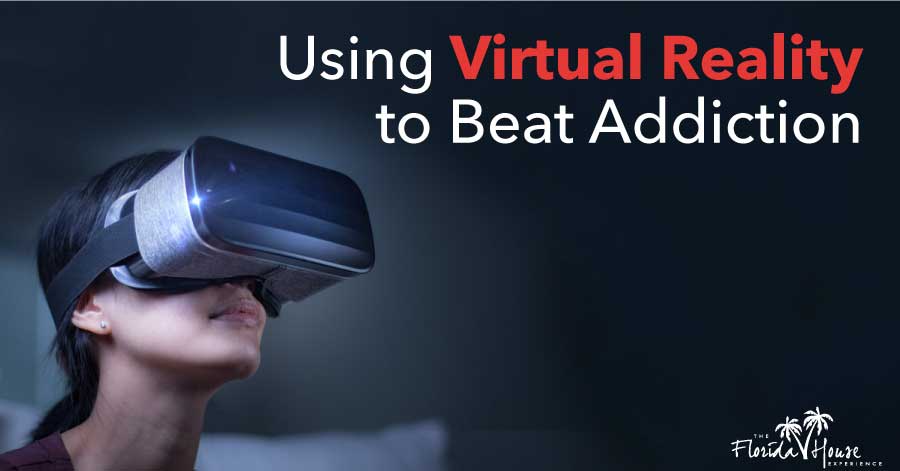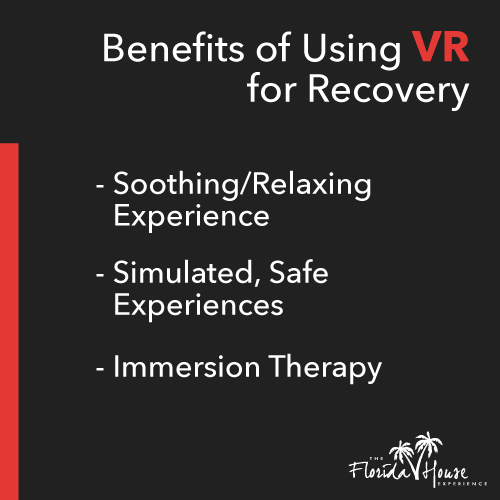
Breaking free from drugs and alcohol can be a challenge, but new technology may be able to help ease the process. Virtual reality, often referred to simply as VR, could be one important new tool in the fight against addiction and substance abuse.
How VR Works
VR involves slipping on a headset to immerse yourself in a virtual world. Unlike simply watching a movie or listening to music, VR surrounds you with the sights and sounds of another place. In some cases, what you see while immersed in VR is a real place that was filmed using special cameras that capture the whole scene. In other cases, the virtual world you see and hear is imaginary. In either case, the entire world is self-contained and completely structured, so you can use it to face fears or triggers in a safe, controlled environment.
Using VR to Teach Recovery Skills
 One way rehab facilities are starting to use VR is as a tool to help teach clients the skills necessary to resist temptation. Therapists immerse clients in a VR setting that might trigger cravings or where they might encounter peer pressure to imbibe in drugs or alcohol. Examples might include a bar or party scene. During the VR session, the client can practice different methods of resisting, making it more likely that once they encounter similar situations in the real world, they can successfully say no to drugs and alcohol.
One way rehab facilities are starting to use VR is as a tool to help teach clients the skills necessary to resist temptation. Therapists immerse clients in a VR setting that might trigger cravings or where they might encounter peer pressure to imbibe in drugs or alcohol. Examples might include a bar or party scene. During the VR session, the client can practice different methods of resisting, making it more likely that once they encounter similar situations in the real world, they can successfully say no to drugs and alcohol.
For people in recovery who have had difficulty establishing and maintaining the kinds of relationships necessary for long-term success, VR can also help teach healthy relationship skills. Practicing how to communicate effectively and control difficult emotions in a virtual setting makes it easier to do those things in the real world after a treatment program is completed.
Breaking Cravings with VR
Immersion in VR isn’t just a passive experience, and the active nature of walking through scenarios where drugs and alcohol are present may have an effect on the brain itself. For many people, drug and alcohol use is triggered by specific sounds, smells or visual stimuli. Cravings might occur when the individual sees others smoking at a party or when a certain type of music comes on the radio.
If the client and therapist are aware of these triggers, they can use VR to try to break the link between the stimulus and the craving. Repeatedly exposing the person to a triggering scenario in VR and then not giving them drugs or alcohol could potentially teach the brain not to expect that substance in response to that particular trigger. Once that link is broken in the brain, exposure to the situation doesn’t cause cravings anymore.
VR for Personalized Therapy
In addition to teaching practical skills for real-world use, therapists working with clients in rehab can also use VR to identify any roadblocks that could be hampering recovery. If a client has trouble dealing with specific scenarios in VR, this can let the counselor know to focus on those areas during individual therapy sessions.
Relaxing with VR
VR isn’t just useful for teaching people to resist drugs. It can also offer a safe alternative to drug use for some people.
Soothing scenes with relaxing music provide an alternative way to reduce agitation or stress, so recovering addicts might slip on a headset and spend some time in a VR world instead of relapsing into drug use. Individuals going through withdrawal might benefit from using VR to take their minds off any uncomfortable withdrawal symptoms, and people in recovery who feel overwhelmed after an intense individual or group therapy session might use VR to calm their emotional state.
With so many ways that VR can help people recover from substance abuse, it’s no wonder that more rehab programs are including this technology in their repertoire of treatment. While it isn’t a standalone solution to addiction, VR can complement other aspects of treatment and improve the chances of long-term success.






